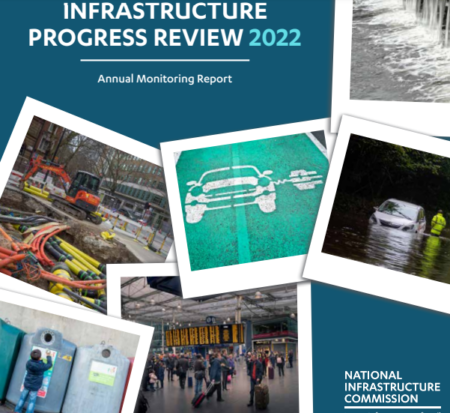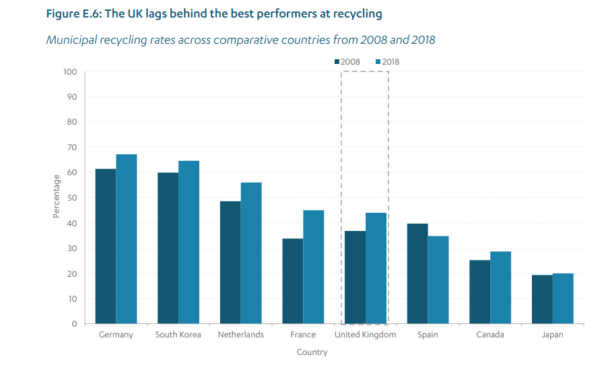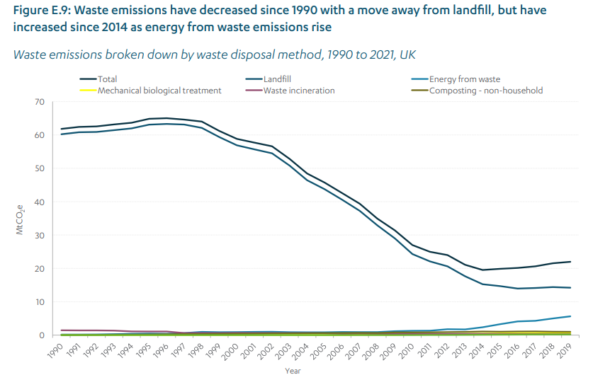And, the NIC warned that waste emissions have risen by 15% since the mid-2010s as waste arisings grew, use of energy from waste (EfW) plants increased and recycling rates stagnated.

The NIC also said the government has “not met” its delivery targets for waste legislation.
It said more action is needed from government to deliver a “low cost and low carbon waste sector”.
Review
The NIC is an executive agency which provides expert advice to the government on infrastructure challenges facing the UK.
The NIC praised the government for launching the UK’s first National Infrastructure Strategy last year.
However it added: “It is also our role, as independent advisers, to sound a warning when we think progress is insufficient towards the goals to which government has committed”.
Waste
The report was split into seven sections covering digital, energy, flood resilience, water and waste.
For waste, the NIC said the government “has gone some way to demonstrating a genuine commitment to increasing recycling rates”, but concrete plans are needed to achieve the targets.
It suggested that finalising policy on key areas such as extended producer responsibility (EPR), deposit return schemes, recycling consistency and bans on certain types of plastics, would help to address the current recycling plateau.
This comes as it was revealed by letsrecycle.com earlier this month that EPR was to be pushed back from 2023, with no current data set (see letsrecycle.com story).
Progress
While government has “outlined a strategy for improving England’s recycling sector, more progress across clear goals and plans are needed,” the NIC said.
For example, establishing a clear target for plastic packaging recycling and firm funding for both municipal and plastic recycling.
The NIC also said the municipal waste recycling rate is “far too low” and has not increased in recent years and called for “urgent action” to address this.
It called for a long term target for plastic packaging, and also said that while the resources and waste strategy sets out a new vision for waste, “without more detailed planning and firm funding commitments, this will not amount to change on the ground”.
It said while the government has indicated good intentions, there hasn’t been enough “action on the ground” to deliver this.

Food waste
On food waste, the NIC also said the government has demonstrated “a genuine commitment to reducing emissions from food waste, supported by a clear funding commitment to separately collect food waste and divert it to anaerobic digestion for biogas production”.
However, it repeated that clear plans should now be delivered to ensure all local authorities achieve separate collection by 2025.
Sector
The report also looked at the performance of the waste sector, which it says has been “stable”.
It pointed to recycling rates for local authority collected waste, which are around 43 per cent, and said the UK is “continuing to lag behind the best international performers in recycling”.
The NIC explained that households pay around £150 a year for waste management, which has remained broadly stable in recent years, but said customer service satisfaction also consistently high.
On the emissions front, it said greenhouse gas emissions have continued to rise, if the emissions from energy from waste plants are accounted for.
The report said emissions from waste peaked in 1996 and decreased steadily as biological waste was diverted from landfill, reducing methane emissions.
As outlined below, since the mid-2010s, emissions have increased by around 15% as waste arisings grew, use of EfW plants increased and recycling rates stagnated.
Food progress
On food, the NIC mirrored previous arguments by saying government has made “good progress in establishing separate food waste collection for households and businesses by 2025”, demonstrating a genuine commitment to change.
However, to ensure that all local authorities achieve this, clear plans should now be delivered.
It said whilst an increasing amount of food waste is being separately collected, this is only a small proportion of total household food waste generated: analysis suggests around 10 per cent of household food waste is currently collected.












Subscribe for free